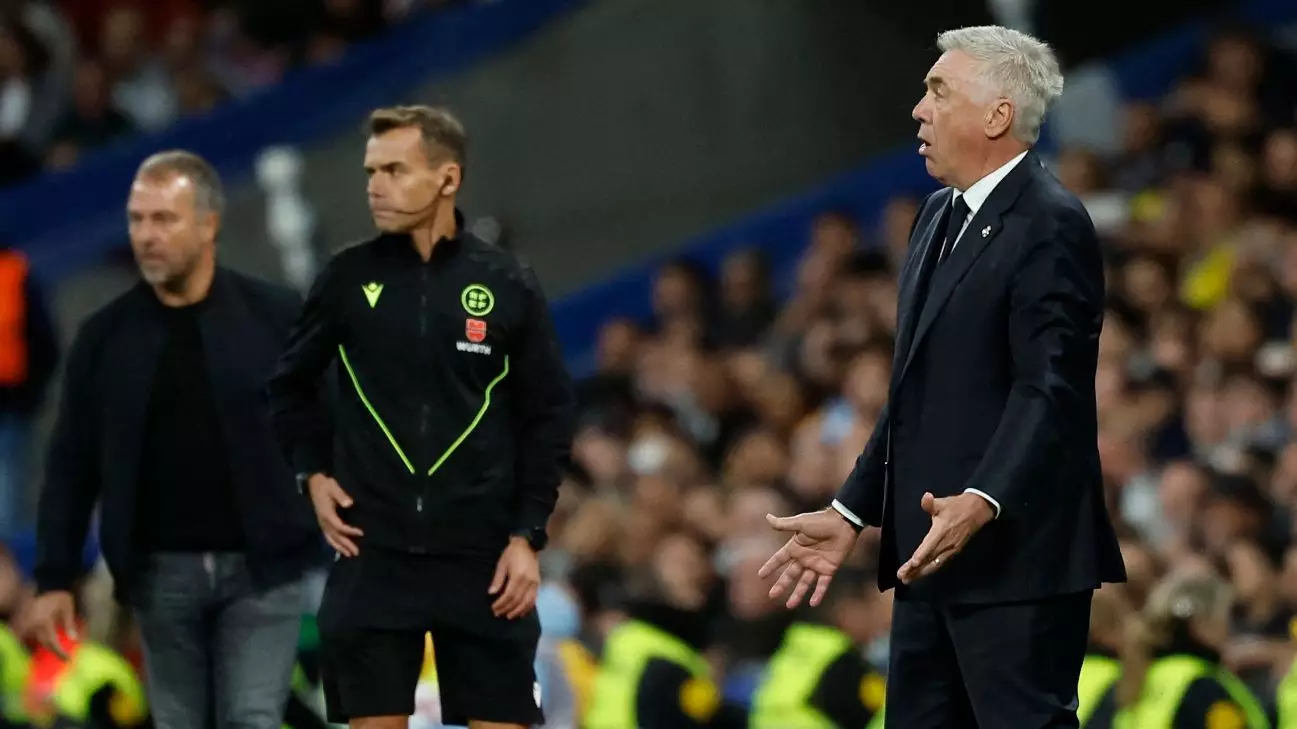The latest edition of El Clásico unfolded at the iconic Santiago Bernabéu Stadium, pitting Real Madrid against their arch-rivals Barcelona. After a thrilling buildup that saw both teams boasting strong form, the match concluded with a staggering 4-0 victory for Barcelona, marking a significant turning point in the La Liga standings. This encounter was not just about the scoreline; it invoked strong emotions, particularly from Real Madrid’s coach Carlo Ancelotti, who expressed his displeasure over the manner in which Barcelona’s players celebrated their fourth goal—essentially rubbing salt in the wounds of a vanquished rival.
Barcelona’s triumph was underpinned by the stellar performance of Robert Lewandowski, who netted two goals. Lamine Yamal, at the youthful age of 17, made history as the youngest scorer in Clásico history, adding a sense of youthful exuberance to the Catalan side’s strategic prowess. Raphinha capped off the scoring frenzy, illustrating the depth of talent within Flick’s squad. As the match unfolded, the stark difference between the two teams’ performances became evident, particularly after the halftime break when Real Madrid failed to maintain their competitive edge.
Ancelotti’s frustrations extended beyond the pitch as he confronted Barcelona’s head coach, Hansi Flick, regarding the conduct of one of Flick’s assistants after Raphinha’s goal. Ancelotti categorically stated that his grievance was not with Flick, but rather with the exuberant celebration that he felt was disrespectful. Flick, in response, struck a conciliatory tone, remarking on the high-pressure atmosphere surrounding such fixtures and the emotional reactions they elicit.
These sideline exchanges contribute to the narrative of rivalry that has defined El Clásico for decades. The match’s intensity not only affects the players on the field but also reverberates through the coaching staff, fans, and broader football community. Ancelotti’s concerns about a lack of sportsmanship highlight the fine line between competitive spirit and unbridled glee, especially in a match with so much at stake. It is an element that adds layers of complexity to the Derby, amplifying stakes for both sides.
Despite a promising first half, Ancelotti pointed out the tactical shortcomings that emerged after the break. Madrid failed to capitalize on their scoring opportunities, illustrating a lack of clinical finishing that proved costly. Ancelotti’s acknowledgment of their missed chances underscores a recurring theme: the inability to convert potential into reality during critical moments.
Kylian Mbappé’s performance, although energetic, was mired in misfortune. With two goals disallowed for offside, the French star’s night epitomized Madrid’s struggles. Caught offside eight times throughout the match—which tied the record for the most in a single La Liga fixture—Mbappé’s inability to navigate Barcelona’s high defensive line symbolized Real’s difficulties in exploiting gaps and converting attacks into goals. Ancelotti’s comments regarding the need for precise execution highlight that Real Madrid’s tactical execution fell short, ultimately resulting in a morale-sapping defeat.
In stark contrast to Real Madrid’s performance, Barcelona’s victory capped off an extraordinary week in which they triumphed over Bayern Munich in the Champions League. Under Hansi Flick’s management, the team seems to have found its rhythm, boasting an impressive record with 12 wins in the last 14 matches across competitions. Flick’s measured response to the victory reflects a seasoned perspective; while acknowledging the team’s outstanding performance, he calls for continued improvement and discipline.
Flick’s approach involves balancing celebration with grounded preparation. He emphasized the significance of maintaining momentum and harnessing the confidence gained from such performances. Success breeds success, and as Barcelona continues to accrue victories, the team appears poised for an exciting season ahead.
As the dust settles from this monumental clash, both teams are left to ponder the implications for the season ahead. For Real Madrid, the need for rejuvenation and reevaluation is paramount. Ancelotti’s post-match insistence that they must learn from this defeat and remain resilient will be crucial as they navigate upcoming fixtures.
Conversely, Barcelona will aim to capitalize on this momentum and solidify their position at the top of La Liga. The psychological edge that comes with a decisive El Clásico victory can rejuvenate a squad, fostering a winning mentality that may propel them through the challenges that lie ahead.
In the world of football, the highs and lows can shift swiftly, and this clash serves as a reminder of the fierce competition that defines Spanish football. El Clásico remains not just a sporting event but a psychological battleground, where victories can build confidence, and defeats can either break spirits or forge resilience. The 4-0 scoreline may signify one chapter, but the story is far from over.

